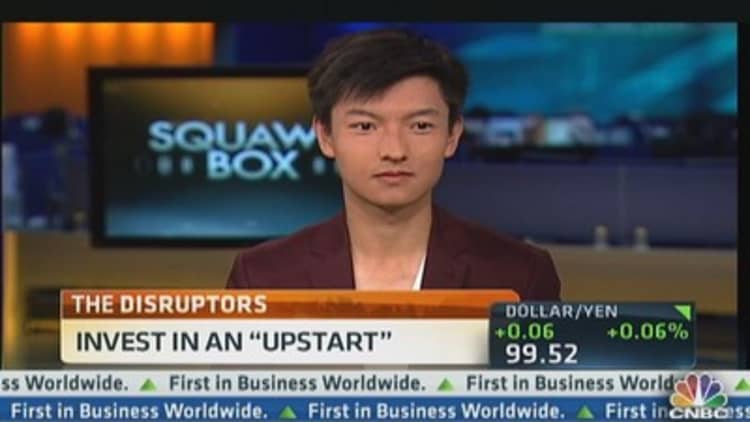Think potential doesn't pay the bills? It can now.
A young company called Upstart makes it possible to buy a share of someone's future income. From the side of the upstart, as the company calls its fund-seeking clients, it's a way to facilitate riskier career moves while still being able to pay the iPhone bill.
It's crowdfunding for castle builders—and micro-investing for mentors.
"The problem we're trying to solve is we think young people don't have the ability to optimize for their learning and their long-term success because they don't have enough money," co-founder Paul Gu told CNBC's "Squawk on the Street." "People who can't get the right level of education or people who don't work on start-up opportunities because they need to take the safe job."
(Read More: Taxi Apps: Changing the World While New York Waits)
Qualified investors can buy a 1 percent share of a decade of an upstart's earnings for about $4,000 to $20,000, depending on predictive income calculations performed by Upstart. They sell in $100 increments. Gu said his own 1 percent went for $25,000.
Just imagine—what if you could've bought 1 percent of Mark Zuckerberg's income back when Facebook got its first office in 2004? That multi-million-dollar fantasy is one the company may like you to entertain.

And what about the lean years? When income comes in under $30,000, that year's payments are canceled and a one-year extension is added, for a maximum of five additional years.
In its first year, 135 backers have collectively invested more than $1 million in the company's 83 upstarts. Thousands have applied, Gu says, "But we're being very selective about the people we allow on the site and making sure investors have good choices."
(Read More: Crowdfunding May Be More Bust Than Windfall for Small Business)
Upstart itself makes money by charging fees—2 percent to 3 percent for the upstarts, a half-percent for the backers.
A Head Start-up
Brandon Chicotsky says he was trying something similar with family and friends—asking for money on which he promised a return—when he first heard of Upstart.
He quickly realized the "formidable and reputable investment community behind it"—Google's Eric Schmidt and Peter Thiel's Founders Fund put nearly $6 million into the company this week.
"Upstart has allowed me to stay in early-stage startups," says Chicotsky, whose company BaldLogo.com has more than a million hits on its YouTube page. He is also vice president of marketing with an Austin-based tech startup offering college planning to incoming freshmen (he declined to identify it, citing concerns about overexposure during early stages).
The 2012 NYU grad says without Upstart backing he'd have buckled under the weight of his student debt and gotten "a cookie-cutter corporate position."
Two percent of Chicotsky's first decade of income cost his backers $14,000. If, as Chicotsky hopes, the Austin company breaks $1 million this year and is subsequently bought out for some multiple of that, his backers may be well on their way to a healthy return.
(Read More: Big Data: March Madness Math in the Real World)
Melanie Plageman is an upstart promoting East African hip-hop to Kenya and the West.
The entertainment promotion company she's building, House of Exeter, has created the music distribution platform Bomba, and next month is launching a collaborative music blog between a North Carolina DJ and a Kenyan rapper.
Building both product and markets and finding the new pathways to profitability in an industry in utter upheaval may seem a tall order, but Plageman has inspired her 13 investors to back her to the tune of $50,000.
Both Plageman and Chicotsky say the mentoring aspect of Upstart is at least as important as the money. "There's much more return value for me with this debt strategy, which involves active investors," says Chicotsky. "Banks are entirely impersonal and offered me higher rates for comparable funds. I essentially traded one bad interest rate for a much improved rate, while gaining an investor community."
Plageman said Upstart empowered her "to ask myself what I would do if I could do anything." She reflected on an earlier visit to Nairobi and how it seemed rich with opportunity amid a rising middle class, and how she fell for the music—she couldn't believe it wasn't known globally. "I know that I'll be successful," she says. "I know that it'll work."
A Backer's Perspective
That kind of youthful exuberance can be a force unto itself, but it can give some investors pause.
"There's some awfully woolly visions," says backer Andrew Okun, who just began investing on Upstart about six weeks ago.
He said he chose three upstarts to back based on the clear focus and coherence of what they were trying to do—grandiose and multifaceted missions were red flags.
Okun says his investment was small and that he has "no expectations" regarding returns on investment. "I see it as experimental."
Mainly he's excited about how the Web, and outfits such as Upstart, have made the efficiencies of micro-funding and micro-investing possible—"the frictionless capacity for people to raise money in small amounts," he says.
Follow @Matt_Twomey on Twitter.


